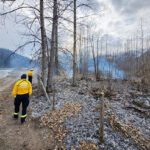Home »

Province acts to support B.C.’s most vulnerable
As British Columbians work to reduce the spread of the coronavirus, the province is taking action to protect vulnerable people, including those experiencing homelessness, in communities around British Columbia.
Initial actions include:
* a ban on evictions for non-payment of rent in BC Housing-funded buildings;
* the development of distinct protocols and identification of sites to support isolation for vulnerable people experiencing homelessness – sheltered or unsheltered – and those in private single room occupancy (SROs) and social housing buildings;
* sustaining service providers through continued payments to ensure they can pay their staff and operating costs; and
* centralized procurement for critical supplies needed by frontline providers, including gloves and cleaning products.

“Frontline workers are working tirelessly to ensure that vulnerable residents are protected across the province, recognizing the significant added risks that vulnerable people face in the context of the COVID-19 crisis,” said Selina Robinson, Minister of Municipal Affairs and Housing. “We are committed to making sure these frontline workers have the support they need to do their job – whether that’s in the form of safe spaces for people who need isolation or personal protective equipment for staff working in the field. We are all in this together.”
Recognizing that vulnerable people in different circumstances face distinct risks, a provincial Vulnerable Population Working Group is working to identify, assess and address the immediate challenges faced in particular by five groups – people living on the street, people experiencing homelessness living in encampments, shelter residents, tenants of private SROs and tenants in social and supportive housing buildings.
This working group includes representatives from the ministries of Municipal Affairs and Housing, Social Development and Poverty Reduction, Indigenous Relations and Reconciliation, Mental Health and Addictions, Children and Family Development, Health, as well as Emergency Management BC, the City of Vancouver, the Office of the Provincial Health Officer, local health authorities, BC Housing and Community Living BC.
Isolation protocols are being developed in partnership with local governments and health authorities based on the needs of vulnerable residents in each region. While in some situations self-isolation may be possible within a unit, additional locations have been identified throughout the province for those situations where off-site isolation of one or more people is required. In addition, recognizing that many providers have identified difficulty in sourcing necessary medical and cleaning supplies, BC Housing is now procuring personal protective equipment needed by frontline workers on a central basis and is distributing them directly to housing providers.
“While all of us are feeling the effects of the COVID-19 crisis, there is no doubt that our most vulnerable populations including the homeless and the working poor are disproportionately affected,” said Shane Simpson, Minister of Social Development and Poverty Reduction. “We are working together with our partners at every level of government and in the social services sector to find safe and efficient ways to provide supports to the people who need them the most as quickly as possible.”
Recognizing that many residents may face challenges in making rent payments as a result of COVID-19, BC Housing has implemented a moratorium on eviction for non-payment of rent in their directly managed properties and is also working with non-profit housing providers around the province to do the same. In addition, the process of applying for a rent reduction is being streamlined for tenants who have lost income as a result of COVID-19, including changing the rules to remove the requirement for proof that the decrease in income is permanent.
People experiencing homelessness often have higher rates of health concerns, and as a result could be at greater risk if exposed to COVID-19. For that reason, enhanced screening and cleaning protocols are in place at residential facilities to reduce the potential that this virus can spread within the building and beyond. To support partners’ efforts, BC Housing is also working closely with the Ministry of Health, the provincial health officer, local health authorities, the BC Non-Profit Housing Association and the Aboriginal Housing Management Association to ensure non-profit providers can protect their guests and residents. This includes providing training and support in encouraging social distancing, best practices in building cleaning and maintenance, identification of on- and off-site isolation spaces, and access to testing and other services.
A joint Ministry of Municipal Affairs and Housing and Ministry of Social Development and Poverty Reduction media release outlined specific actions to date.
Supporting vulnerable tenants facing a loss of income
* Placing a moratorium on evictions of tenants for non-payment of rent in BC Housing’s directly-managed homes, and working with partners to implement the same in subsidized and affordable housing during the outbreak.
* Working with housing providers to streamline the process to apply for rent reductions for those tenants in BC Housing supported buildings who have lost income as a result of COVID-19, including removing the requirement for proof that income reductions are permanent and making changes to the process to support social distancing.
Responding to growing food-insecurity among vulnerable populations
* Arranging food-delivery service, starting next week, for tenants in subsidized and affordable housing in the Lower Mainland experiencing food security challenges. This will be replicated in other regions if required.
* Setting up central storage space for frozen meals to be distributed to housing providers if required.
Supporting providers in responding to the crisis
* Sourcing cleaning and personal protective equipment, such as masks and gloves, centrally for distribution to meet the needs of frontline workers in the housing sector.
* Supporting non-profit housing and shelter providers to meet the unique challenges of responding to this crisis though webinars for housing and shelter providers to share information, best practices and tools, in partnership with regional health authorities.
* Supporting shelter operators, supportive housing buildings and SROs with funding for COVID-19 related costs, such as staffing and additional cleaning supplies.
Ensuring safe shelter for vulnerable people
* Conducting a province-wide inventory and identifying sites available in 16 communities for accommodating vulnerable populations, including those in need of spaces for self-isolation.
* Responding to the increased risk of violence against women and children that can occur as a result of social distancing by accommodating women and children fleeing violence in hotel rooms on as-needed basis.
* Identifying more than 1,000 modular homes that are ready to be installed quickly if required, while coordinating with local governments and health authorities on where these resources might be best deployed.
* Procuring sprung structures that can be set up in a matter of days in open areas to provide additional shelter if required.
* Extending operation of temporary shelters where possible in order to maintain shelter space that would otherwise close at the end of March 2020.
Supporting agencies during this crisis
* To ensure essential services continue, contracted service providers will continue to receive the same level of funding as they would have otherwise and are expected to continue to pay their staff and operating costs.
* Contracted service providers experiencing increased costs due to staff shortages, increased overtime and/or increased demand as a result of COVID-19 will receive incremental funding to continue the delivery of essential services.
New task forces with municipalities around the province, health authorities, as well as housing and shelter providers, continue to work urgently to identify further needs and gaps in communities and roll out supports for vulnerable populations.
e-KNOW







